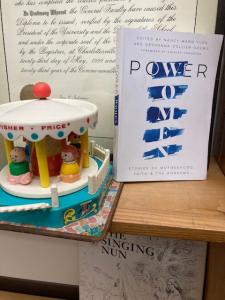A mother expecting her twenty-fifth baby is just one of the shocks that greet young midwife Jenny, main character of the new PBS series Call The Midwife. Imported from the BBC, the show is adapted from a book of the same title by Jennifer Worth, midwife, nurse, and musician, who died in 2011.
This is England? Some reviewers wonder whether Americans are ready for this kind of London life: slums and poverty of the East End, plus graphic scenes, not of eros but of birth. Anglophiles on this side of the pond may prefer to see England as all abbey, aristocracy, and royal celebrity.
The book and TV series are drawn from Worth’s stint working in a convent, here named St. Raymond Nonnatus house, offering nursing and natal care to families in the East End. Jenny and her colleagues ride bikes through lanes clogged with laundry to tend patients in flats without running water. What we see through Jenny’s eyes is not glamorous. It’s gritty, bombed out from World War II, crowded and dirty. Men are employed in the docklands, loading and unloading barges. Worth deserves credit for her social history of the place, which despite its roughness maintains a certain integrity. Unlike the poverty some Americans now face, it is not beset with unemployment and broken households. Crime, addiction, and pests plague this neighborhood, but families do relatively well. Fathers have jobs, marriages are intact, respectability matters, and neighbors know each other (and each other’s business).
The characters who draw our attention are mostly female. Of course a show on midwives has a lot to do with babies, but this is not mostly about how cute, cuddly, and precious newborns are. Instead, the birth of a baby is story in the life of a mother. Carrying and delivering a baby are serious works. They are made harder and sometimes dangerous by conditions of poverty. In Worth’s London, doctors are called in an emergency. But in the show we see with hearteningly plausibility the competence of midwives to handle most check-ups and births. Many families avoid hospitalization and prefer to deliver at home. Birth is a big event but not first and foremost a medical one. The midwife, like the new baby, enters into a home life that has drama and character of its own.
More than one commentator is at pains to point out the role here of the National Health Service (NHS), quite new in the setting of Call the Midwife. It seems to me that the Anglican sisters of Nonnatus house minister to the poor from motives distant from state mandate. In the book, several midwives explicitly claim Christian calling, forsaking wealth and privilege for nursing. Worth is an agnostic when she first comes to Nonnatus but develops real respect for the calling of the nuns. The energy of the story comes from the pairing of female fecundity and the consecrated single life. Monastic vows are demanding, Worth admits, but “harder still is the task of living, day in, day out, with your Sisters in God.” Although the sisters live simply and more quietly than their neighbors, parallels abound. The nuns are committed to a common life, and the mothers they serve honor tight family bonds. We are all bound to each other, whether our vocation is to monastic or family life.
A scene in the book illustrates this well, when Jenny must spend Christmas in a client’s home waiting for a birth. She and her colleague Sister Bernadette sit at conspicuous remove from the noisy jollity of Christmastide, while the expectant mother is humored through labor by the hooting and singing of her family downstairs. Instead of highlighting the loneliness of their situation—poor single women without children of their own at Christmas—or gushing out sentiment over a Noel baby, Worth directs our gaze liturgically. We look with Worth at Sister Bernadette holding her breviary, “fair young face in the firelight, reading the ancient prayers.” The author eventually is moved to conversion by loving the sisters in their love of God.
In the TV version there’s no rush to religion, but who knows what the midwives, bicycle-borne and coming to the rescue, will discover next.
















